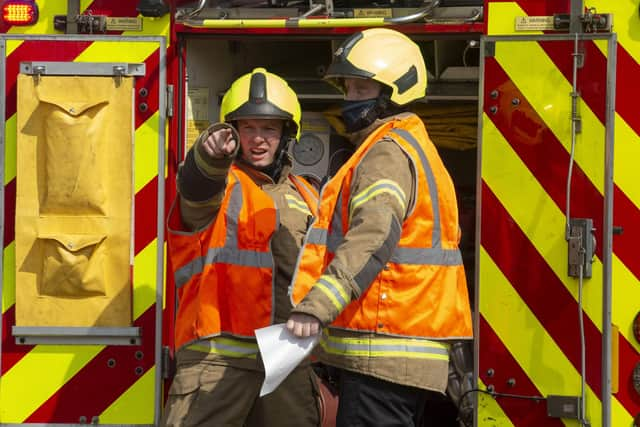Around 64,000 hours of Scottish firefighters' time wasted each year due to false alarms new data shows
On average, the SFRS mobilises two fire appliances and nine firefighters to each of the 28,479 false alarms – equating to around 57,000 unnecessary blue light journeys annually.
Most alarms are activated by faults or other causes like steam or burnt food with only two per cent actually involving a fire, most of which are put out before the arrival of crews.
Advertisement
Hide AdAdvertisement
Hide AdAssistant Chief Officer Stuart Stevens said businesses and partners can play a key role in reducing these figures and has called on them to get involved in the consultation.
He said: “The advantages of getting duty holders to accept their legal responsibilities and reducing these call-outs are clear.
“Making this change means we can free up firefighters’ time, be even more responsive in genuine emergencies and use SFRS resources more effectively.
“We can also carry out more training and fire prevention activity, as well as realising the related benefits of improving road safety and reducing our carbon impact.”
He said that the unnecessary blue light journeys are a risk to not only the crews, but to other road users and pedestrians as well.


In addition, they produce an estimated 575 tonnes of carbon emissions – the equivalent of heating 230 homes a year.
The 12 week consultation can be accessed here and brings the SFRS into line with the majority of UK fire and rescue services response to workplace automatic fire alarms (AFAs).
It is seeking responses on three potential options: Operations Control (OC) challenging all AFAs from non-domestic premises, unless exempt, OC staff challenging all AFAs from non-domestic premises or the service not attending any AFAs from non-domestic premises.
Advertisement
Hide AdAdvertisement
Hide AdIt has received a strong response from the public, however there is currently a low response rate from businesses and workplaces – the ones which would be most impacted by the proposed changes.
ACO Stevens added: “It may be that these businesses and organisations are taking their time to fully consider the proposed options and I’m also aware last month we were just coming out of a holiday period which is why we’re issuing this appeal for those most affected to take part in the consultation and play their part in helping to shape the future response model.”
The legal responsibility for dealing with AFA alerts lies with the duty holder of a property, and the majority of rescue services in the UK seek confirmation of a fire before attending.
ACO Stevens said that it is time for the SFRS to make that change too.
He added: “Each of the options, which have all been risk assessed, will see a significant reduction in the number of Unwanted Fire Alarm Signals we attend.
“We want to know what those most affected think of our three proposed options, I urge them to have their say on how they think we can best use our resources to keep them, their families and their communities even safer.”
A message from the Editor:Thank you for reading this article. We're more reliant on your support than ever as the shift in consumer habits brought about by coronavirus impacts our advertisers.
If you haven't already, please consider supporting our trusted, fact-checked journalism by taking out a digital subscription.
Comments
Want to join the conversation? Please or to comment on this article.
